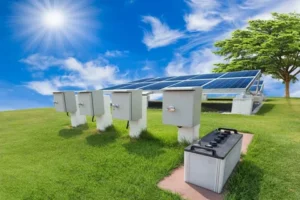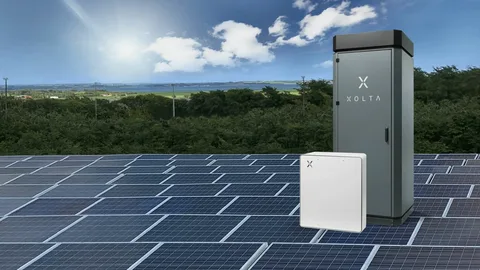Are you tired of worrying about rising energy costs and unreliable power sources? Look no further! This comprehensive guide will show you how to maximize efficiency with solar battery storage systems. Say goodbye to high electricity bills and hello to a more sustainable way of living. Get ready to take control of your energy usage and unleash the full potential of solar power technology. Let’s dive in and discover how to harness the sun’s energy like never before!
Introduction to Solar Battery Storage Systems
Welcome to the bright future of energy efficiency! Imagine harnessing the sun’s power to generate electricity and store it for later use. That’s where solar battery storage systems come into play. These innovative solutions are revolutionizing how we power our homes, offering a sustainable and cost-effective alternative to traditional electricity grids. Join us on a comprehensive guide to maximizing efficiency with solar battery storage systems and discover how you can take control of your energy consumption like never before.
How does Residential Solar Battery Storage Work?
Residential solar battery storage works by capturing and storing excess energy generated by solar panels during the day. These systems consist of lithium-ion batteries that store the electricity produced, allowing homeowners to use it later when the sun isn’t shining. When sunlight hits the solar panels on your roof, they convert this light into DC (direct current) electricity. The energy flows from the panels into an inverter, which is converted into AC (alternating current) power used in most homes.
Excess electricity that is not immediately needed is sent to the battery storage system for safekeeping. This stored energy can be utilized during peak demand times or at night when solar panels are inactive. By integrating these systems with your existing solar setup, you can maximize the self-consumption of renewable energy and reduce reliance on traditional grid power. It’s a smart way to make your home more sustainable and efficient.
Benefits of Using Domestic Solar Battery Storage
Decreased Energy Costs
One of the biggest benefits of using domestic solar battery storage is the potential for decreased energy costs. By storing excess solar energy during peak production times, homeowners can reduce their reliance on the grid and avoid expensive peak-hour electricity rates. In addition, many utility companies offer incentives and credits for utilizing solar battery storage systems, reducing overall energy costs.
. Increased Energy Independence
Another advantage of using a domestic solar battery storage system is increased energy independence. With a traditional grid-tied solar system, homeowners still rely on the grid for electricity when their panels are not producing enough energy or at night when there is no sunlight. However, with a battery storage system, homeowners can store excess energy generated by their panels for later use, providing them with a backup power source and reducing their dependence on the grid.
Flexibility in Energy Usage
Solar battery storage systems also give homeowners more flexibility in using their stored energy. Instead of being limited to just powering essential appliances during power outages or high-demand times, homeowners can use stored energy whenever they want – during peak hours or at night when there is no sunlight.
Environmental Benefits
Using domestic solar battery storage systems can also have significant environmental benefits. By relying less on traditional fossil fuel-generated electricity from the grid, homeowners can reduce their carbon footprint and contribute to a cleaner environment. Additionally, as technology continues to improve and more households adopt renewable energy sources like solar power and batteries, it will lead to an overall decrease in greenhouse gas emissions on a larger scale.
Factors to Consider When Choosing Solar Battery Storage Units
Solar battery storage units are a crucial component of any solar energy system. They allow for storing excess energy generated by solar panels during the day, which can then be used at night or when there is not enough sunlight. However, with so many available options, choosing the right solar battery storage unit can be overwhelming. To help you make an informed decision and maximize efficiency with your solar battery storage system, here are five important factors to consider:
Battery Capacity
The capacity of a battery refers to how much energy it can store. When choosing a solar battery storage unit, it is essential to consider your household’s average daily energy consumption and select a unit with enough capacity to meet those needs. It is also advisable to factor in potential future increases in energy usage.
Type of Battery
There are various types of batteries used for solar storage, including lead-acid, lithium-ion, and saltwater batteries. Each type has pros and cons regarding cost, lifespan, efficiency, and Maintenance requirements. Therefore, it is crucial to research and compare different types before deciding.
Efficiency
The efficiency of a battery determines how much energy it can store and discharge without losing power over time. A higher efficiency rating means the battery will hold more charge for longer periods without frequent recharging. Consider this factor carefully, as it directly impacts the overall effectiveness of your solar battery storage system.
Warranty
Solar batteries are designed to last for many years; however, they do have a limited lifespan. Therefore, it is vital to look into the warranties different manufacturers offer when selecting a solar battery storage unit. A longer warranty period indicates confidence in the product’s quality and gives you peace of mind knowing you are covered if any issues arise.
Cost
Finally, yet importantly, cost plays a significant role when choosing any component of a solar energy system. While it may be tempting to go for the cheapest option, it is essential to consider the long-term costs of a battery, including Maintenance and replacement. A higher upfront cost for a more efficient and reliable battery may save you money in the long run.
 Comparison with Traditional Electricity Grids
Comparison with Traditional Electricity Grids
The differences are evident when comparing solar battery storage systems to traditional electricity grids. Traditional grids rely on centralized power generation from non-renewable sources like coal and natural gas. On the other hand, solar battery storage systems harness energy from the sun, a clean and renewable source.
One key advantage of solar battery storage is its ability to store excess energy generated during peak sunlight hours for later use when sunlight is unavailable. This feature allows homeowners to reduce their reliance on the grid during high-demand periods, saving money on utility bills.
In contrast, traditional grids face challenges with transmission losses over long distances and are susceptible to outages due to system failures or natural disasters. Solar battery storage systems offer a more reliable and resilient alternative by providing backup power in case of grid failures.
Overall, the comparison highlights how residential solar battery storage can revolutionize how we consume and manage energy in our homes.
Installation and Maintenance of Household Solar Battery Storage
So, you’ve decided to leap into renewable energy by investing in household solar battery storage for your home. The next step is installation. It’s crucial to consult with professionals to ensure proper placement and wiring of the system.
The installation involves securely:
- Mounting the batteries, connect.
- Connecting your existing solar panels and in.
- Integrating in your home’s electrical system.
- Routine maintenance is key to ensuring optimal performance.
Regularly checking the system for any wear or malfunction can prevent costly issues. Cleaning the panels and inspecting connections are simple tasks that can prolong the life of your solar battery storage system.
By staying on top of maintenance tasks and addressing any issues promptly, you can enjoy uninterrupted access to clean energy while maximizing efficiency in your household.
Case Studies of Successful Implementations of Residential Solar Battery Storage Systems
Let’s explore real-world examples of successful residential solar battery storage systems implementations. In California, a family reduced their electricity bills significantly by pairing their residential solar panels with a battery storage system. This helped them save money and allowed them to have backup power during outages.
A commercial building in Australia saw a remarkable decrease in its carbon footprint after installing a solar battery storage unit. The business could rely on clean energy and lower its operating costs simultaneously.
Furthermore, a rural African community experienced improved access to reliable electricity thanks to distributed solar battery systems. This initiative positively impacted the residents’ education, healthcare, and overall quality of life. These case studies highlight the diverse applications and benefits of integrating solar battery storage systems into different settings worldwide.
Future of Solar Battery Storage for Homes
The future of solar battery storage for homes is brimming with potential and innovation. As technology advances, we expect to see more efficient and cost-effective solutions emerge. With increased research and development, these systems will likely become more accessible for consumers, including households looking to reduce their carbon footprint.
One exciting prospect is integrating smart technology into solar battery storage systems. This could enable users to monitor and optimize their energy usage in real time, maximizing efficiency and savings. Additionally, advancements in battery chemistry may lead to longer lifespans and higher energy-density batteries, further improving the overall performance of these systems.
As renewable energy sources continue to gain traction globally, it’s safe to say that solar battery storage will play an increasingly crucial role in shaping the future of sustainable energy solutions. Investing in solar battery storage for residential or commercial use now sets the stage for a greener tomorrow.
Conclusion:
After exploring the ins and outs of solar battery storage systems, it’s clear that investing in this technology is a smart move for households looking to maximize efficiency and reduce reliance on traditional electricity grids. With the ability to store excess energy generated by solar panels for later use, homeowners can take control of their energy consumption and potentially save money in the long run. By harnessing the power of solar battery storage systems, individuals can contribute to a more sustainable future and enjoy greater independence from fluctuating utility prices. As advancements continue to make these systems more affordable and efficient, investing in residential solar battery storage is becoming increasingly compelling.
FAQs
1. What is a solar battery storage system?
A solar battery storage system is a technology that allows you to store excess energy generated by your solar panels for later use instead of feeding it back into the grid. This stored energy can be used when your solar panels are not producing enough electricity, such as at night or on cloudy days.
2. How do solar battery storage systems work?
Solar battery storage systems include batteries, an inverter, and a charge controller. The batteries store the energy generated by the solar panels. The inverter converts this energy from direct current (DC) to alternating current (AC), which can power your home appliances. The charge controller regulates the flow of electricity between the batteries and the solar panels, ensuring that they are charged efficiently.
3. What are the benefits of using a solar battery storage system?
- a) Increased self-consumption: With a solar battery storage system, you can use more energy you generate rather than send it back to the grid.
- b) Lower electricity bills: By storing and using your energy instead of buying it from utility companies, you can save money on your electricity bills.
- c) Backup power: In case of power outages or emergencies, a fully charged solar battery storage system can provide backup power for essential appliances.
- d) Environmental impact: Solar battery storage systems help reduce reliance on fossil fuels and lower carbon emissions.
| Other Good Articles to Read |
| Niche Blogs Connect |
| Blogs 97 |
| Blog Stitution |
| Blogs Unplugged |
| Blogs Cotch Rouge |
| Blog Signatr |
| Blog Sintonias |
| Blog Zilla |
| Consumer Forums |
| Finance Forums |
| G Blogs |
| Too Blog |
| Related Business Listings |
| Contact Directory |
| Local Business Profiles |

